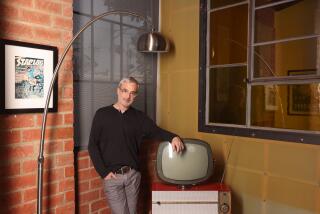A GALAXY NEAR YOU
THE new “Battlestar Galactica,” which recently completed its third season on the Sci Fi Channel, has surprisingly little in common with the original “Battlestar Galactica.” The first version is something of a relic of the immediate post-”Star Wars” disco era, with Lorne Greene and that plush robot dog. The current incarnation turns out to be among the most politically sophisticated shows on the air. A riveting and nuanced portrayal of nation-building, insurgency and occupation, the show speaks directly to our world post-9/11 and the ongoing conflict in Iraq.
Actress Mary McDonnell (an Academy Award nominee for “Dances With Wolves” and “Passion Fish”) plays Laura Roslin, former secretary of education and 43rd in the line of succession for the presidency forced to assume that leadership following catastrophic events. Grappling with restructuring a government, sparring with the military and battling cancer, Roslin draws from the quiet resolve and inner strength that is McDonnell’s stock in trade. Traits that will come in handy after it was announced recently that next season will be “Battlestar’s” last.
What was your initial reaction when you were first told about “Battlestar Galactica”? Did you think, ‘I’ve been nominated for two Oscars and I’m getting offered a remake of this space show?’
They sent the offer to me, and I was surprised but not for the reason you said. I didn’t see myself in a sort of pristine sci-fi world. That’s what surprised me. And I was curious, ‘Why would they want me?’ So I read it that night and I knew immediately why they wanted me and I understood how exciting it was. So I didn’t really have a lot of time between the offer and reading it to second guess.
How much is the extent to which the show deals with our real-world current events discussed during production? Does Ron Moore, creator of the new show, ever explain the larger allegorical ideas?
No, he just writes them. He doesn’t necessarily talk to us that much about what he’s intending. Mostly, we just play the story as it is and we recognize its allegorical components. However, I will say, the man who directed the miniseries [that launched the show] and who directs a lot of our episodes, his name is Michael Rymer, and I remember when we were doing the miniseries one of the things he said to all of us was, ‘Just think 9/11.’
He’d say it a lot, to keep re-rooting ourselves in, ‘Oh, we are in the middle of talking about our lives, we are not in space.’ So that’s where we started, the idea of it being rooted in contemporary issues is very strong. And as an actor ... you don’t have to go far to find the stuff you need. These are all of our concerns.
Because it comes cloaked as a sci-fi show, as well as being perceived as a remake, do you think it has a tougher time reaching a broader audience? Potential Emmy voters?
I don’t know what to say about that. I do know a personal story, that comes from both the AFI awards and the Peabody awards, where the show has won. It turns out I know someone connected to both committees and in both instances it took one person to convince everyone else, ‘You’ve got to watch this.’ And it was that simple, just like that. So it just takes one person to stand up and say to their colleagues, ‘You’re missing something.’
Talking to you, you seem a much more upbeat and energetic person than your roles as President Roslin or in films like “Donnie Darko” or “Independence Day” might lead one to believe. Why do you think you tend to be cast as somewhat dour, downbeat characters?
I think Laura Roslin was very specifically written as a woman who is not an extrovert. But I’m not sure ... it’s a fascinating question. I’ve done two sitcoms where that part of my personality that’s the most exterior, that giddy, cheerleader kind of gal who has fun -- every once in a while, she’s asked for. But what people see on my face in front of the camera and the sort of unconscious strength that I guess I carry is what they really hire me for. I don’t see these people as dark, I just play the humanity of it and then, whatever. But I guess you’re right when I think about it.
It feels a little odd to be telling you about yourself.
We’re in the business of allowing ourselves to be projected upon. If you can’t take it gracefully you might as well get out.
More to Read
The complete guide to home viewing
Get Screen Gab for everything about the TV shows and streaming movies everyone’s talking about.
You may occasionally receive promotional content from the Los Angeles Times.







